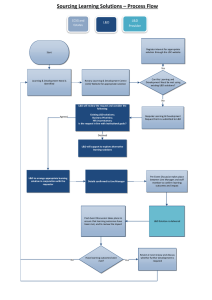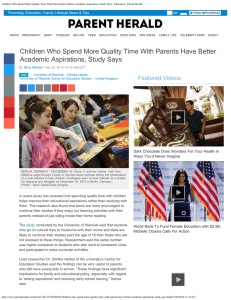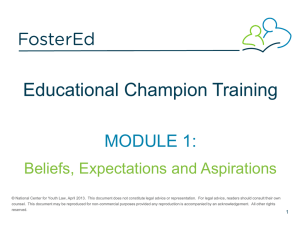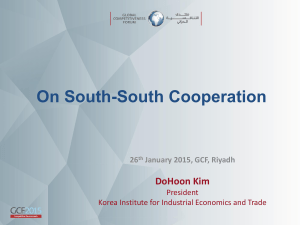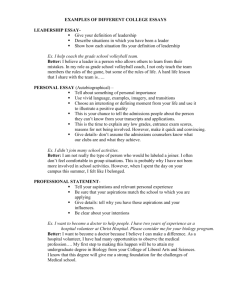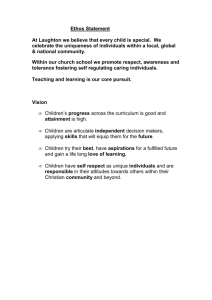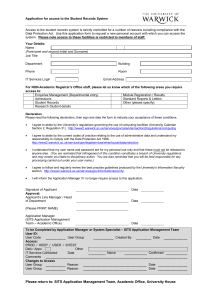Career Conversations
advertisement
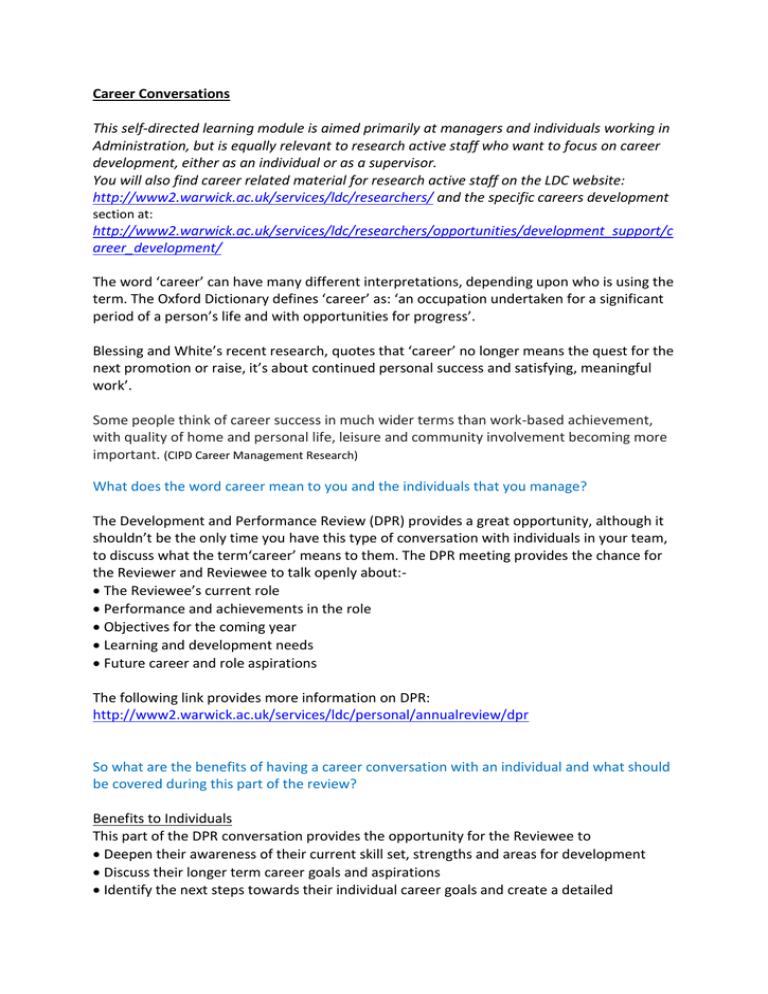
Career Conversations This self-directed learning module is aimed primarily at managers and individuals working in Administration, but is equally relevant to research active staff who want to focus on career development, either as an individual or as a supervisor. You will also find career related material for research active staff on the LDC website: http://www2.warwick.ac.uk/services/ldc/researchers/ and the specific careers development section at: http://www2.warwick.ac.uk/services/ldc/researchers/opportunities/development_support/c areer_development/ The word ‘career’ can have many different interpretations, depending upon who is using the term. The Oxford Dictionary defines ‘career’ as: ‘an occupation undertaken for a significant period of a person’s life and with opportunities for progress’. Blessing and White’s recent research, quotes that ‘career’ no longer means the quest for the next promotion or raise, it’s about continued personal success and satisfying, meaningful work’. Some people think of career success in much wider terms than work-based achievement, with quality of home and personal life, leisure and community involvement becoming more important. (CIPD Career Management Research) What does the word career mean to you and the individuals that you manage? The Development and Performance Review (DPR) provides a great opportunity, although it shouldn’t be the only time you have this type of conversation with individuals in your team, to discuss what the term‘career’ means to them. The DPR meeting provides the chance for the Reviewer and Reviewee to talk openly about:The Reviewee’s current role Performance and achievements in the role Objectives for the coming year Learning and development needs Future career and role aspirations The following link provides more information on DPR: http://www2.warwick.ac.uk/services/ldc/personal/annualreview/dpr So what are the benefits of having a career conversation with an individual and what should be covered during this part of the review? Benefits to Individuals This part of the DPR conversation provides the opportunity for the Reviewee to Deepen their awareness of their current skill set, strengths and areas for development Discuss their longer term career goals and aspirations Identify the next steps towards their individual career goals and create a detailed development plan to achieve them Benefits for Managers An opportunity to: Provide behavioural feedback to individuals on areas of strength and those for development Deepen understanding of the career goals and aspirations of individuals within the team Enhance the capability of both individuals and the team, through development and stretching assignments in line with individuals’ aspirations and departmental goals Deepen motivation and engagement levels Benefits for the University The development of knowledge, skill and behaviours required by the University now and in the future, to achieve its vision Increased levels of staff engagement Enhanced return on investment on staff development Enhanced Employer reputation making it easier to recruit the highest quality individuals and retain intellectual capital What is the reviewer responsible for? Reviewer Responsibilities Provide the opportunity for the Reviewee to discuss their career goals and aspirations during their DPR discussions and/or at other pertinent times for the individual Facilitate a constructive, supportive but challenging conversation which enables individuals to articulate their career goals and aspirations Consider the goals of the department/centre or research project and the University and discuss how the individual’s needs align with these goals Provide honest behavioural feedback which deepens an individual’s understanding of their strengths and development areas Facilitate the Reviewee in identifying the next steps towards their career goals Provide opportunities, if possible, within an individual’s current role/department to develop the knowledge, skill, attitudes required for their desired future Provide any advice or information that you think would be helpful to them in achieving their career goals If you are able, introduce them to key individuals within your own network who may be able to provide further advice/information/opportunities Ask the individual what they need from you, their manager, to support them in achieving their objectives. Signpost them to further resources that may be useful in enabling the individual to deepen their thinking around their career goals To analyse the current knowledge, skill and capability levels within the team, versus the future departmental or research project direction, vision and goals, and consider how to address any gaps that may exist between the two in both the short and long term. Consider what development individuals may require to close this gap and how this aligns with individuals’ career aspirations. Concerning projects in particular, assess how individuals in the team have developed throughout the project, how this will support their career opportunities post-project and address any development needs to support their career aspirations following the project. Seek assistance from your HR/LDC Adviser if you require further assistance What is the Reviewee responsible for? Reviewee Responsibilities To take time to consider their strengths, development areas and future career aspirations To research/analyse the knowledge, skill and capabilities required to progress towards their future career goals To consider how their future career aspirations could potentially be met, taking into account the goals and objectives of their current role, the department and the broader University To identify the next steps towards achieving their desired future and what support they may require to achieve these Be open to honest behavioural feedback and use this to inform your future development To be proactive in seeking and utilising developmental opportunities that align to their career aspirations, for example: new tasks or skills, additional responsibilities, job shadowing, secondments, networking, research or teaching opportunities, learning or voluntary activities. For research staff this could include joining departmental committees or starting a network of peers/related to their field of research. In addition to your line manager, consider a mentor to support you in achieving your career aspirations. The LDC website has details of the University Mentoring Scheme or you may have a previous line manager/colleague who would like to approach to undertake this role: http://www2.warwick.ac.uk/services/ldc/coachmentor/wcm What are the underlying principles of career conversations? Underlying Principles Individual definitions of career success and satisfaction will be different. As a Reviewer you are seeking to provide opportunities for individuals to meet their personal career goals in a way that benefits the department and University. It is useful to think of the performance level and potential of the individuals within your team, when considering the most appropriate opportunities to provide to enhance an individual’s desired career route. An individual may, for example, be performing well in their current role and have aspirations towards a role in another department. They are seeking funding for the external qualification required to work in this department but have demonstrated little potential for the level of influencing that would be key to success in this new role. Feedback and development on their influencing skills would be the first developmental priority, in this situation. Research staff may consider enhancing their perceived skills by broadening their responsibilities, such as taking on teaching opportunities or joining a committee inside or outside the organisation. • Effective use of the DPR and Career Conversation can: - Go a long way in engaging individuals with their work, making them feel valued, and fostering commitment to the role/department and the University - Promoting responsibility and initiative, and facilitating adaptation to new challenges and change By developing able and motivated employees and giving them an environment in which they can excel, effective career management should, in conjunction with other factors, enable the University to achieve its vision Career management is also about accommodating and supporting employees’ obligations to their home lives such that they are productive and effective while they are at work. What are the key skills required to conduct a Careers Conversation? Coaching - a one to one process which, through skilful questioning, active listening and staying on the coachee’s agenda, encourages commitment, enhances performance and promotes a climate of motivation and mutual development and learning Relationship Building - the quality of your career conversations will be highly dependent upon the degree of trust within the relationship Time Management Mindset - constructive, flexible and solution focussed If you wish to read more about these key skills or enrol on a workshop to enable you to build or enhance them, please visit the LDC website for more details of the self-directed learning modules http://www2.warwick.ac.uk/services/ldc/sdl and workshops that are available http://www2.warwick.ac.uk/services/ldc/development How should I structure a careers conversation? The DPR provides an ideal opportunity to discuss the Reviewee’s career goals and aspirations. The subject may come up at any point during a DPR conversation or you may need to provide the opportunity to expand the conversation in this way. Clearly the approach you take will need to be tailored to the individual you are in conversation with, however the ‘GROW’ model, explained further in John Whitmore’s book Coaching for Performance, provides a particularly useful framework for structuring a Conversation The model has four stages which can be summarized as: Goal - What are the individual’s current career aspirations and goals? Potential questions: What are your current career aspirations and goals? What exactly is it that you would like to achieve? What is your motivation behind that? What makes you think you can achieve that? (Beware of your tone of voice with this question) What is a realistic timeframe for achieving the goal? If the aspiration/goal may take some time to achieve, what are the immediate steps/ priorities for achieving it? What is a realistic timeframe for these first steps? Reality - Where are you now in relation to these aspirations/goals? Potential questions: Where are you now in relation to your career goals/aspirations? What steps have you already taken towards these goals/aspirations? What were the results of your actions? What is the knowledge, skill, capability gap between where you are now and where you want to be? What barriers are there currently? How might you overcome these? Who else is impacted upon by your career goals/aspirations? How are they impacted? Options - What are the possible options/steps for achieving the career aspirations/goals? (This is about thinking creatively about potential options before then reviewing these options and testing their feasibility, to select a suitable way forward) What could you do to bridge the gap in your knowledge, skills and/or capability? What else could you do? What if there were not any barriers in your way, what could you do then? Who might be able to assist you in developing your knowledge, skills and capabilities? What assistance would you like? What would you most like to do? What is it about this option that appeals to you? Will - What actions will the individual take to achieve their aspirations/goals? Potential questions: Reviewing all of the options you have come up with, which one(s) would you like to take forward? If you do this, how will it enable you to achieve your career goals/aspirations? How would you know that you had successfully achieved your chosen options? What would tell you? How would you measure it? What would be the benefit to you if your actions were successful? What could get in the way of you carrying out your chosen actions? If there is anything, how will you get around it? Who else needs to know about this? Is there any support that you need to carry out this action? If so, how will you go about getting it? When are you going to do it, or start it? The Reviewees should add the agreed actions to their Performance and Career Development Plan to ensure continued focus on their goals and as a means of tracking progress. Researchers may wish to consider using an e-portfolio to support their development planning, or the Vitae Researcher Development Framework (RDF): https://www.vitae.ac.uk/researchers-professional-development/about-the-vitaeresearcher-development-framework/developing-the-vitae-researcher-developmentframework It is important that you have ongoing conversations with an individual around their progress both towards their objectives that have been agreed for the year, as well as their Performance and Career Development Plan. The plan supports both an individual’s development for their current role and progression towards their desired career goals/aspirations. This could form part of any regular meetings that you have with the individual regarding their work or more formal meetings perhaps monthly or quarterly, dependent upon what timescale is agreed between you and the Reviewee. During these discussions it would be helpful to review: The individual’s progress against their Performance and Career Development Plan What has gone well and what has the individual learnt from this? What hasn’t gone well/to plan? What has been learnt from this? What (if any) changes need to be made to the Performance and Career Development Plan /Objectives? What support might the individual need to succeed? Career Scenarios you may experience during career conversations: An individual who wants to progress their career but is unsure of the direction A potential way forward is to discuss/identify the current strengths and areas of interest of the individual. In doing this, opportunities may become apparent to expand their current role or a potential future direction. Signpost additional resources to enable an individual to continue their exploration: What does the individual enjoy about their current role? What aspects of the role do they not enjoy/enjoy less? What about previous roles, what have they enjoyed, been good at? What aspects of their previous roles have they not enjoyed, been good at? What talents/interests do they utilise outside of work that they would perhaps like to use in a future role? What roles/departments within the University interest them? What particularly interests them about that role/department? What do they know about the role/department? How could they find out more? The Student Careers and Skills website has a number of diagnostics which may help an individual to deepen their awareness of their strengths, values, personality type, learning styles, and potential roles they may be interested in. http://www2.warwick.ac.uk/services/scs/started/developingself/ The LDC website contains further advice and guidance on career progression http://www2.warwick.ac.uk/services/ldc/careerprog/ and advice and guidance on identifying your learning needs http://www2.warwick.ac.uk/services/ldc/plan/ An individual who is interested in a role for which they do not currently have the skills and experience A potential way forward is to discuss/identify their motivation for the role and to then use the GROW framework discussed above, to enable the individual to identify exactly what knowledge, skills and experience they need to obtain and the first steps they could take to develop these. What particularly draws you to this role? What are the knowledge and skill requirements for the role? How could you find out more about this role? (if required) What are your current knowledge and skill levels in these areas? What additional strengths would you bring to the role? What first steps could you take to obtain the knowledge and skills required for this role? When will you take this action? The Identifying your Learning Needs section of the LDC site may be helpful for this individual http://www2.warwick.ac.uk/services/ldc/plan/ If you do not share the same perception as an individual, regarding their current capabilities or potential to undertake a different role, and you have behavioural evidence to back this perception up, it is important that you are candid in your belief and provide honest developmental feedback to an individual. This enables the individual to deepen their awareness of their capabilities and approach their development accordingly. An individual, who does not wish to develop beyond their existing role. They want to do a good job and leave the office on time. A potential way forward is to discuss/identify what they enjoy about their current role and what changes they envisage within the department/University/Higher Education/Economy which may impact on the role and its requirements in the future. It is helpful to enable the individual to understand that although they may wish to stay in the same role, aspects of the way they perform in it may need to change over time, as the environment in which they perform it changes. Provide behavioural feedback on their effectiveness in the role What do you enjoy about your current role? What areas you interested in developing? What enhancements have you made to the way in which you do your job in the last 6 months? What enhancements do you envisage may be required in the next 6 months? What impending changes are you aware of within our department, the University, HE or the economy which may impact on the requirements of your role in the future? What might you need to do to prepare for these changes and ensure your continued high level of performance in the role? What development might you need? What are the steps to achieving this? What timescales are appropriate for this? A stellar performer within your department who is ambitious A potential way forward is to discuss/identify their career goals and ambitions and to work collaboratively with them to identify what developmental opportunities could be made available to them/created for them which also meet the needs of the department/ University. It is important to potentially maintain a University wide perspective during these discussions as the stretching opportunities required by these individuals to further their career may need to be provided by a broader University experience rather than in just one department. What are your current career goals and aspirations? What exactly is it that you would like to achieve? What is your motivation behind that? What makes you think you can achieve that? ( beware of your tone of voice with this question) What is a realistic timeframe for achieving the goal? If the aspiration/goal may take some time to achieve, what are the immediate steps/priorities for achieving it? What is a realistic timeframe for these first steps? If the individual is not already working with a Mentor it may be worth making them aware of the University’s Mentoring scheme http://www2.warwick.ac.uk/services/ldc/coachmentor/wcm or encouraging them to identify a potential Mentor from their existing network.
